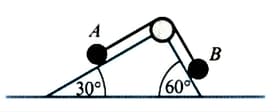Two smooth pulleys are apart at the same horizontal level. A light inextensible rope passes over the pulleys and a box of mass hangs at each end of the rope. A third box of mass is attached to the midpoint of the rope and hangs between the pulleys so that all three boxes are at the same horizontal level. The total length of the rope is Find the value of



Important Questions on Connected Particles
A mass of is held on a rough horizontal table. The coefficient of friction between the table and the mass is The mass is attached by a light inextensible string to a mass of and by a second light inextensible string to a mass of The strings pass over smooth pulleys at the edges of the table. The mass hangs on one side of the table and the mass hangs on the other side of the table. The system is released from rest.
Find the acceleration of the masses.
A mass of is held on a rough horizontal table. The coefficient of friction between the table and the mass is The mass is attached by a light inextensible string to a mass of and by a second light inextensible string to a mass of The strings pass over smooth pulleys at the edges of the table. The mass hangs on one side of the table and the mass hangs on the other side of the table. The system is released from rest. Find the tension in each string. (The acceleration of the moving mass is .)
A wedge has two smooth sloping faces; one face makes an angle with the horizontal and the other makes an angle with the horizontal. A small smooth pulley is fixed at the apex of the wedge. A light inextensible string passes over the pulley and lies parallel to the faces of the wedge. At each end of the string there is a particle of mass The system is released from rest.
Show that the tension in the string is

A wedge has two smooth sloping faces; one face makes an angle with the horizontal and the other makes an angle with the horizontal. A small smooth pulley is fixed at the apex of the wedge. A light inextensible string passes over the pulley and lies parallel to the faces of the wedge. At each end of the string there is a particle of mass The system is released from rest.

Work out the resultant horizontal force on each of the particles.
A box of mass hangs from a light inextensible string, which passes over a smooth pulley fixed below a beam and then under a smooth cylinder of mass that is free to move. The other end of the string is fixed to the beam. The system is released from rest.

Explain why the magnitude of the acceleration of the cylinder is half the magnitude of the acceleration of the box.
A box of mass hangs from a light inextensible string, which passes over a smooth pulley fixed below a beam and then under a smooth cylinder of mass that is free to move. The other end of the string is fixed to the beam. The system is released from rest.

Find the acceleration of the box, including its direction.
A horizontal shelf of mass hangs from four strings. A book of mass sits on the shelf. Four strings are attached to the underside of the shelf and a second horizontal shelf of mass hangs from these strings.
What modelling assumptions can be made about the strings?
